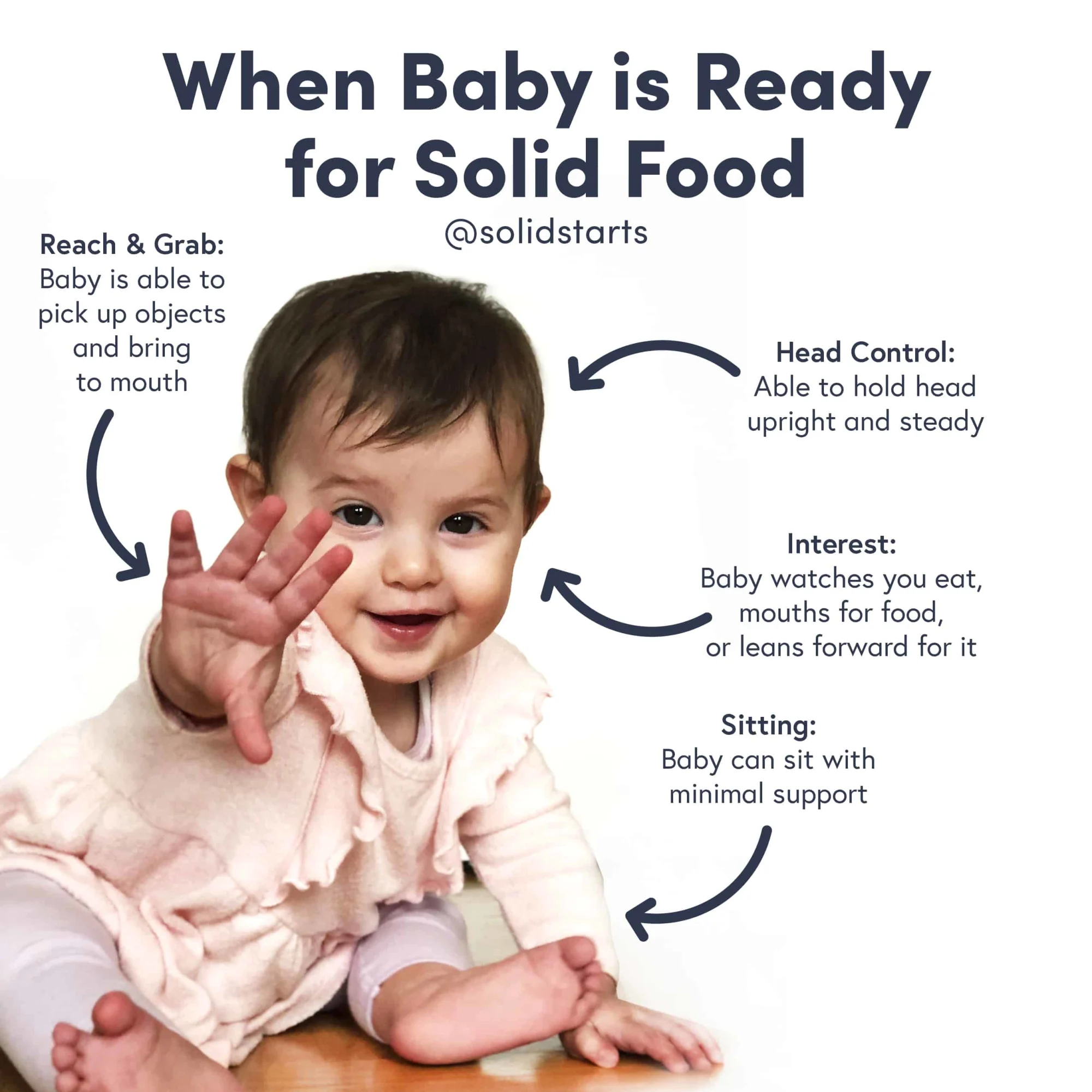Readiness to Start Solid Food

Around 6 months of age, most babies are developmentally ready to start solids, but how do you know for sure? Learn the signs from Solid Starts—a multidisciplinary team of pediatric pros helping you raise a happy eater.

When can my baby start eating solid food?
Introduce solids as soon as baby shows all of the signs that they are developmentally ready to practice eating real food. Most full-term babies are ready around 6 months of age, though some are ready a bit earlier and some a few weeks later. For premature babies, look for signs of readiness around 6 months chronological age. Check out When to Start Solids with Preemies for more guidance.
You may be told to introduce rice cereal and purees around 4 months of age, but this is outdated advice. While recommendations vary from country to country, both the American Academy of Pediatrics and World Health Organization agree that around 6 months of age is the ideal time to introduce solid foods.

Signs Baby is Ready to Start Solids
A baby is ready to start solids when they have reached all of the following developmental milestones:
Sitting: Baby can sit with minimal support
Head Control: Baby can hold head upright and steady while seated (about 15 minutes)
Reach & Grab: Baby can pick up objects while seated and bring them to the mouth
Interest: Baby intently watches you eat, mouths for food, or leans forward to reach it
Is your baby ready? The Solid Starts App is the home of our guided experience to help you navigate first bites and beyond. Learn more.

What does sitting with “minimal support” mean?
Baby can keep the head and neck stable while sitting upright without flopping forward, immediately falling to the side, or hunching back while seated in a high chair or your lap. When baby uses their arms while seated, they don’t topple over. A little support from one arm and hand on the floor is okay, but baby is not ready if they can only sit with both arms and hands planted on a surface for stability. It is normal for a baby who is ready to start solids to need “minimal support” for stability, such as a pillow around their hips, a rolled-up towel in their high chair, or your arm or hands at their hips.
Got questions on high chairs? Check out our Ultimate Guide to High Chairs for Babies.
Blythe, 5 months old, sits strong with minimal support in a high chair

Mahalia, 6 months old, sits and reaches with minimal support from a boppy pillow
Is sitting with support okay for babies?
Supported sitting on the floor or in a high chair for a few minutes helps strengthen a baby’s muscles as the child learns to shift weight and correct for loss of balance. This is a widely accepted therapeutic practice for babies with and without delays in their development, and there is no research to suggest that it slows their development or harms their body. Just make sure baby is properly positioned with support from your arm, a pillow, or a rolled-up towel for a little stability. If you are using a sitting "container" like a bumbo seat, baby swing, bouncy seat, car seat, or stander, consider limiting the time to no more than 30 minutes; regularly placing baby in these sitting containers may slow down the development of muscles and movement.
Maeve, 6 months old, sits with some support from mom while reaching for a toy

Maya, 6 months old, sits with some support from a pillow while playing with a toy
What if baby is 6 months old but cannot sit up on their own?
If baby cannot sit without a little support from you, wait a week or two to introduce solid food, including purees. At a minimum, baby should to be able to sit completely upright (in a high chair or on your lap) and keep their head upright. If baby needs to be reclined to be stable, they are not ready. Some babies are not ready to start solids until closer to 7 months of age, and that is okay. You can help baby get ready by creating lots of opportunities to build strength with floor time play, such as tummy time and side lying. For more ideas, check out, Best Activities for Preparing for Solids.
★ Tip - If baby is not yet sitting with minimal support by 7 months of age, contact your pediatric healthcare provider for support
Should I wait to start solids until the tongue thrust is gone?
It is not necessary. The tongue thrust is the reflex that causes the child’s tongue to stick out of the mouth when touched. While some suggest waiting to start solids until it disappears, this approach is not supported by research, and it ignores the helpful role that the tongue thrust plays as babies learn to eat real food. To learn more, check out our article, Tongue Thrust & Starting Solids.
My 6-month-old baby is not ready. What about iron?
How much iron a baby needs is unique and dependent on age, medical status, and diet, all babies need iron from food around 6 months of age. Formula can meet a baby’s iron needs, and while breast milk contains some iron, some breastfed babies may need a little extra support from an iron supplement. Talk to your pediatrician for individualized guidance and check out Iron-Rich Foods for Babies for more information.
Should baby start solids at 4 months for weight gain?
Generally, no. Around 4 months of age, babies are not developmentally ready to eat sufficient amounts of solid foods for weight gain (either purees or finger foods) and breast milk or formula should be their only source of nutrition. Often, introducing solid food at this age can lead to pressure to eat and negative associations with food. Also, many purees are lower in calories than breast milk or formula.
If baby is having difficulty gaining weight before 6 months of age, they are likely not consuming enough breast milk or formula and/or may have an underlying medical condition. Work with a doctor to identify and treat the underlying condition, as well as a pediatric dietitian to carefully increase the caloric content of breast milk or formula, if needed.
Should I introduce allergens at 4 months of age?
There is no need to start solids before your baby is ready unless the child faces a high risk of food allergy due to eczema or an existing food allergy. Emerging evidence suggests exposure to common food allergens such as egg and peanut at this early stage for high risk babies can help reduce the risk of a food allergy from developing. While this may seem counterintuitive since baby is not developmentally ready for solid food, there are developmentally appropriate ways to introduce allergens in puree or liquid forms. Refer to Introducing Allergens for more guidance and consult your pediatrician or pediatric allergist to develop a plan.
When to Seek Help
If baby is around 6 months of age, consult your pediatrician if the child experiences any of the following:
Difficulty holding the head up for short periods of time
Unable to hold body up for short period of time when supported on your lap
Consistent lack of interest in reaching for or grabbing toys
Minimal to no mouthing of toys or hands
Significant changes in weight
Significant decreases in daily wet diapers
Overall lethargy or low energy
General inconsolable irritability
Hard, difficult-to-pass poop
Visible blood in poop
Frequent coughing and/or sputtering at the breast or bottle, especially if paired with frequent upper respiratory infections or unexplained fevers
When so many things fall into the “it’s normal” bucket when it comes to infant development, it’s hard to know when to ask for more help. Your pediatrician is the first step, and sometimes a little reassurance is all you need. They can also help you determine if you need a referral to a pediatric developmental specialist, dietitian, or other pediatric medical specialist.
Need help starting solids? Download the Solid Starts App.
Written By
K. Grenawitzke, OTD, OTR/L, SCFES, IBCLC, CNT. Pediatric Feeding/Swallowing Specialist
K. Rappaport, OTR/L, MS, SCFES, IBCLC. Pediatric Feeding/Swallowing Specialist
M. Suarez, MS, OTR/L, SWC, CLEC. Pediatric Feeding/Swallowing Specialist
V. Kalami, MNSP, RD, CSP. Pediatric Dietitian/Nutritionist
R. Ruiz, MD, FAAP, CLC. Pediatric Gastroenterologist
S. Bajowala, MD, FAAAAI. Pediatric Allergist/Immunologist
Ready to get started?
Download the app to start your journey.
Expert Tips Delivered to Your Inbox
Sign up for weekly tips, recipes and more!
Copyright © 2026 • Solid Starts Inc
